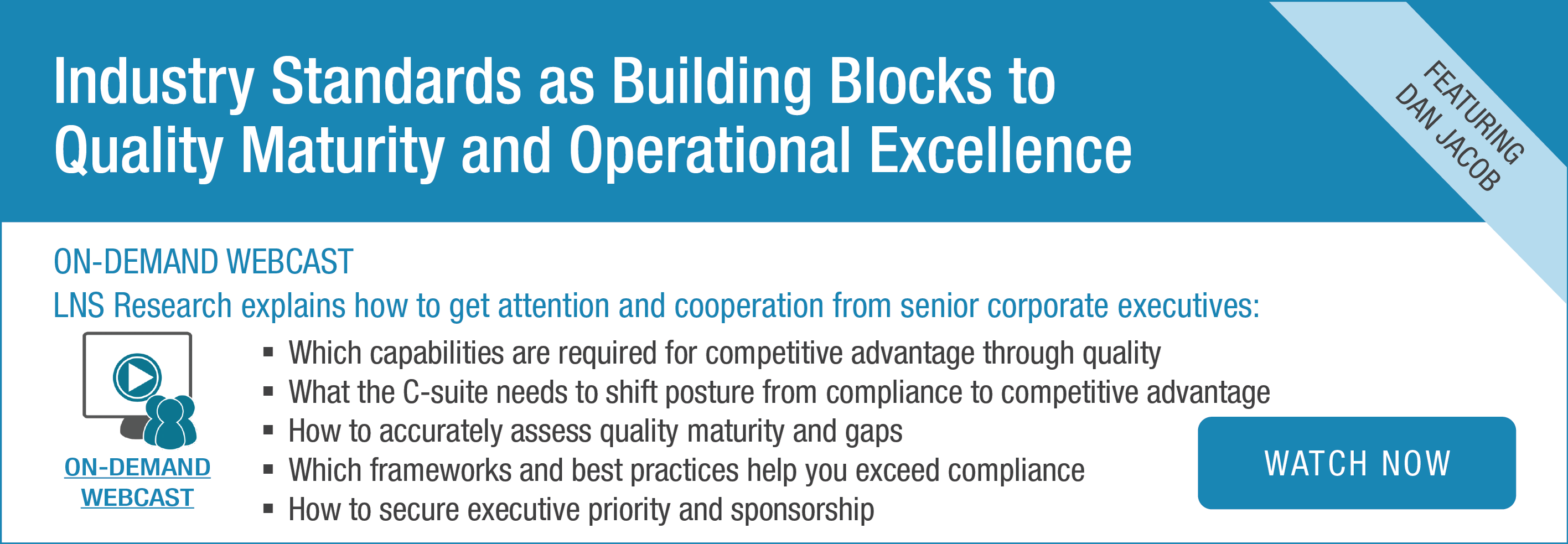On Tuesday, March 20, LNS Research hosted the webcast, “Industry Standards as Building Blocks to Quality Maturity and Operational Excellence.” The presentation examined how to use industry standards to capture the attention and cooperation of senior corporate executives, the capabilities required to achieve competitive advantage through quality, and the results companies should expect.
Q1: I’ve already deployed ISO 9001:2015. How do I use this research to advance my strategy when the compliance event has already past?
A1: This approach works best with standards that aren’t yet deployed. When the standard is implemented, the original, compelling event is gone. That event is “access to markets due to compliance by a given date." The key things to remember are:
- Compliance events are frequent. It is a continuous loop to a certain degree, possibly customer-specific or industry-wide.
- If corporate or peer strategy, objectives, or initiatives change, examine how this impacts your approach to the standard. These changes may open the door to an improved approach to the standard. If the new corporate strategy targets a new industry, more sophisticated customers, global distribution, and new markets, it can drive a reason to revisit.
Q2: Your approach seems to de-emphasize compliance. Compliance is critical to us and an important consideration for our business. How do the two topics blend?
A2: Of course, compliance is a critical fundamental expectation, though it can still be difficult to attain. Many markets have compliance requirements for entry, etc. Compliance is a baseline, it doesn’t differentiate. A “check-box” attitude is dangerous, yet prevalent in many companies.
Q3: Does minimally compliant mean certified to the standards of a third-party?
A3: Minimally compliant means that while the clauses of the standard are supported, there are no additional capabilities that have been embedded in the Operational Excellence landscape. Minimal compliance meets the standard and will pass a third-party audit. However, skills that are desirable for global, collaborative enterprises such as automation with software, real-time business intelligence, enterprise and operational risk management, and automated/integrated supplier quality management all exceed minimal compliance requirement.
 Q4: What is Quality 4.0?
Q4: What is Quality 4.0?
A4: LNS defined this space last year, and we recommend reading our eBooks, spotlights, blog posts, and listening to the recorded webcasts. The most recent decade has seen rapid advances in connectivity, mobility, analytics, scalability, and data, spawning what has been called the fourth industrial revolution, or Industry 4.0. This fourth industrial revolution has digitalized operations and resulted in transformations in manufacturing efficiency, supply chain performance, product innovation, and in some cases enabled entirely new business models. This transformation should be on top of the mind for quality leaders, as quality improvement and monitoring are among the top use cases for Industry 4.0. Quality 4.0 is closely aligning quality management with Industry 4.0 to enable enterprise efficiencies, performance, innovation and business models.
Q5: How can I get training on Industry 4.0?
A5: LNS publishes quite a bit of research on Industry 4.0, and its membership program is designed to build and execute a Digital Transformation strategy.
Q6: How do leading indicators feed into your metrics discussion? Which leading indicators would you prioritize and are these useful in building the executive support?
A6: Let’s start from Quality 4.0 perspective. Quality 4.0 builds upon traditional quality, and one of its 11 elements is analytics, which is further explored in the ebook, Quality 4.0 Impact and Strategy Handbook. Using the Quality 4.0 terminology, leading indicators would be traditional predictive analytics, while their Quality 4.0 counterpart would be machine learning/artificial intelligence which enables capabilities such as predictive maintenance, prognostic asset health monitoring, and zero-defect initiatives.
Predictive analytics are highly valuable and align with the chief information officer (CIO) initiatives like cybersecurity, enterprise Cloud, manufacturing Cloud, mobility, etc. and broader Digital Transformation initiatives. LNS has seen substantial growth in zero defect initiatives, where manufacturers use data from manufacturing assets and processes to better predict field failures and influence online marketplace ratings.
Finally, you asked about leading indicators to prioritize. There are many prominent indicators, and every manufacturer does not need or have access to all. Risk metrics can be a very valuable leading indicator. Supplier defect metrics can be predictors of in-process quality metrics such as first pass yield and scrap/rework costs, which can be predictors of customer complaints, which can be predictors of warranty claims. However, you need to leverage good repeatable correlations, and timely data to properly use leading indicators. No point predicting something if your predictions don’t add value because your levers are after the costs are baked in, or the impact is realized. Predictions are no better than flipping a coin if the correlations are weak, or it takes two weeks to gather data that was only valuable for one. Prioritize the ones that can maximize impact with strong correlations/predictability, and make sure that the data is timely.
